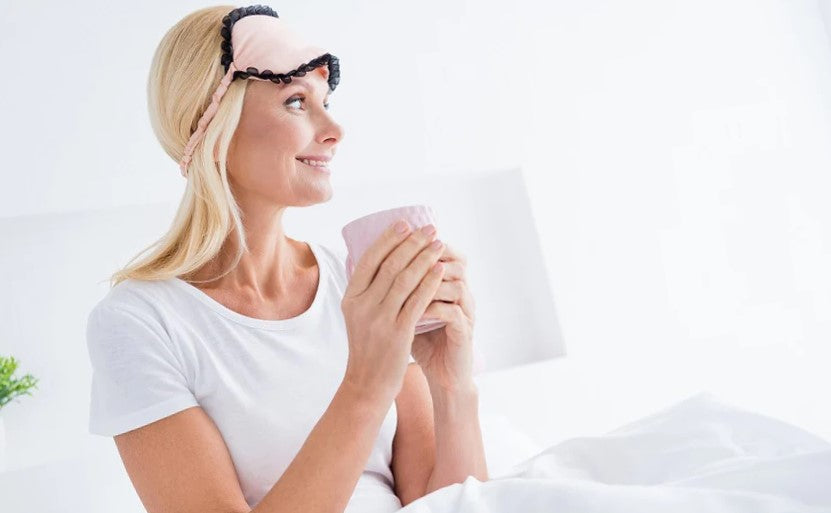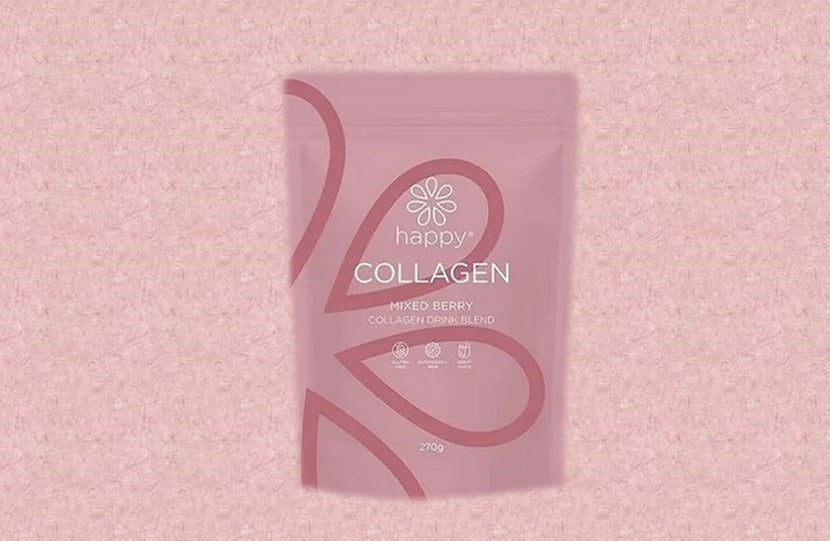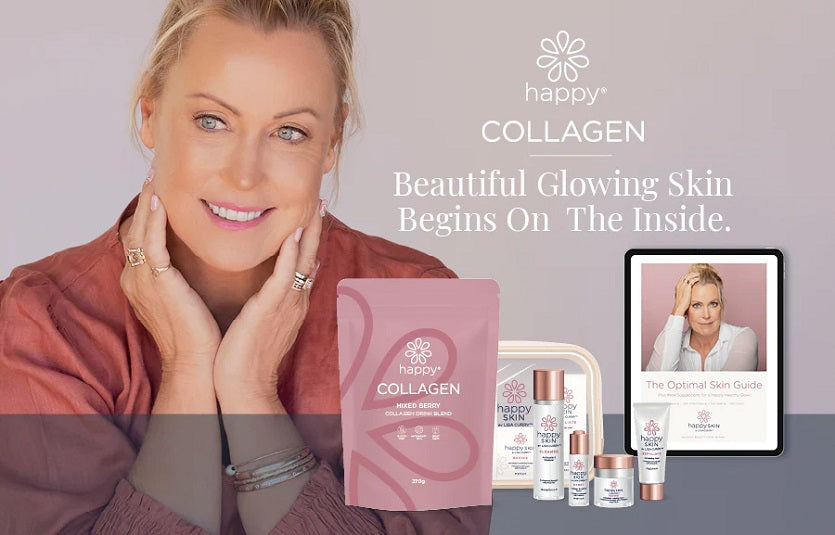What Are The Benefits Of Using Happy Collagen Powder?
By Renee Grandi

Happy Collagen comprises type I, II & III collagen peptides, along with probiotics, prebiotics, and some of the earth’s most promising antioxidant foods and herbs creating the best collagen supplement. They are critical for structural integrity of your arteries, skin matrix, vaginal/uterine tissue, cartilage, bones, joints, hair, skin and nails (plus a whole lot more). Here you’ll learn about HOW Happy Collagen works and define whether it’s right for you. The science speaks for itself.
What Is Collagen?
Collagen is a fibrillar protein that conjoins connective tissues. It’s the scaffolding system of the skin, bone, and joints. Think of it as a support net, a building block, for all of your cellular structures (so it’s kind of a big deal). Collagen is an abundant protein in animals, and collagen peptides are amino acids further deconstructed from proteins.
There are 26 different types of collagen peptides. Collagen types I and III comprise 90% of this skin layer (60%-80% type I) and (15%-20%) type III.
What do collagen Peptides & Collagen Powder Do?
- Improving tendons, ligaments and bone health
- Significantly improving the quality of hair, skin and nails
- Improve the eyes' cornea and eye health
- Repairing cartilage repair and arthritic conditions
- Remodelling cardiovascular structural integrity e.g. veins, arteries and blood vessels
- Helping to rebuild cartilage within the knees, hip, lower back, neck and finger joints
- Supporting bone remodelling and structure
Read more about what collagen peptides are.

What Does Collagen Do For Skin?
Numerous studies have now concluded significant benefits of collagen peptides. If you’re wanting to plump up, collagen peptides are an ideal intervention as they boast anti-wrinkle, anti-inflammatory, elastin enhancing and crows feet reducing properties. A 12-week study supplementing oral collagen peptides showed:
- 35% reduction in overall wrinkle score
- 20% improvement in cheek elasticity
- 23% improvement in overall face elasticity
- 14% increase in hydration
- 22% increase in radiance
- 25% increase in firmness
- 20% reduction in eye wrinkles
- Protective mechanisms against skin-autoimmune conditions
- Improves skin turnover rate
You can read more about the amazing benefits of collagen for skin health.
Which Collagen Is Best For Skin?
Collagen peptides are renowned for increasing skin hydration and skin barrier function restoration. Happy Collagen is the best collagen supplement and an excellent intervention for eczema, dermatitis, xerosis, hives, dry, sensitive and itchy skin.
What Does Collagen Do For Hair?
Collagen peptides are extensively renowned for hair, skin and nail support. The effectiveness of collagen peptides on hair, skin and nails are established in many clinical trials. Using the best collagen supplement has shown to:
- Reduce brittle nails
- Speed up the nail growth rate
- Reduce nail splitting, fraying and peeling
- Significantly increase hair thickness and strength
- Enhance hair follicle cell communication
- Reduce hair breakage
What Does Collagen Do During Menopause?
Research shows skin architecture rapidly changes following menopause due to lowered estrogen levels (17β-estradiol). The average annual decline in skin collagen post-menopause is 2.1%.
The ovaries, brain, gastrointestinal tract, uterus and vaginal integrity all rely heavily on collagen scaffolding for strength and adaptability. Psychological and sexual changes are predominant during menopause due to vaginal dryness and painful intercourse, this is also a result of changing collagen levels. It’s been shown that post-menopausal women have a significant reduction in collagen types I & III.
It’s been shown that post-menopausal women have a significant reduction in collagen types I & III.
Read more about collagen and menopause benefits.

Collagen and vaginal health integrity
Vulvovaginal atrophy (VVA) is renowned for occurring during menopause with stats ranging from 36% to 90% according to recent surveys. Collagen powder benefits include lowering oestrogen levels which flatten the skin's surface, reducing cellular vaginal energy stores and reducing lactobacilli bacterial strands, thus, increasing vaginal pH. This cascade significantly predisposes you to VVA and genitourinary dysregulation.
With lowered collagen, your thinning vaginal lining becomes susceptible to trauma, bleeding, ulceration, pain, dryness, and pressure during sex. Painful sex occurs in around 76% to 78% of menopausal women. The vulva can also experience burning, sensitivity and increased irritability to clothing, sweat and sitting. It’s critical to have sufficient collagen levels to nourish connective tissue, vascular health and elastin content in this life phase. Only the best collagen supplement will include all the right nutrients to improve vaginal health integrity.
“Painful sex occurs in around 76% to 78% of menopausal women.”
Collagen for uterine health
Research determines Pelvic Organ Prolapses (POP) have a greater association with low oestrogen and collagen levels, one 2019 study (Dökmeci, 2019) determined women with advanced stages of uterine prolapses had signification changes in genes collagen type I (COL1A) and collagen type III (COL3A).
Lowered oestrogen can gradually slow collagen protein production and cause stiffer connective tissue. Collagen powder benefits include a healthy pelvic floor and enhanced crosstalk between uterine and pelvic tissues. Vaginal tissue is susceptible to hormonal changes, women are cyclical beings, thus, our tissues respond differently to hormonal changes.
Collagens' role in cartilage repair
Collagen is a major component of cartilage and connective tissue. Collagen stimulates chondrocytes, these cells produce cartilage and cartilage is a gel-like substance that reduces friction between bones and joints. Collagen peptide utilisation occurs quickly (so long as it’s hydrolysed), with studies showing accumulation in cartilage tissue in just a few hours.
Collagen peptides for pain
Collagen peptides are superior for reducing joint and muscle pain, as well as increasing joint mobility. Studies show substantial benefits for inflammatory joint conditions like arthritis and osteoarthritis. Collagen directly supports cartilage, reduces inflammation and can provide an enhanced quality of life.
Research indicates that inflammatory markers trigger synovial membranes to release collagen III peptides, concluding that the best collagen supplement is essential for ensuring healthy bone joint fluidity, elasticity and circulation.
Collagen peptides for bone health
Oestrogen is required for healthy bones, this makes menopausal women further predisposed to osteopenia or osteoporosis. Approximately 34% of women are diagnosed with osteoporosis post-menopause.
‘Approximately 34% of women are diagnosed with osteoporosis post-menopause.’
Collagen peptides show osteoprotective (bone protective) effects on bone health, particularly, the retention of calcium and upregulation of bone remodelling processes. A 1-year study concluded taking 5g of collagen peptides resulted in a statistically significant increase in bone matrix density in the spine and femoral neck, whereas, the placebo showed a continued decrease in their bone matrix density.
If you’re suffering from bone or joint pain, collagen peptides are an excellent intervention to nourish these structures and reduce inflammation. These are just a few examples of the benefits of collagen powder.
This is why we LOVE our Happy Collagen formation. The best collagen supplement is substantial in such an array of bodily systems. If you have any questions about Happy Collagen, please reach out to support@happyhealthyyou.com.au or our FB groups.
REFERENCES
Avila Rodríguez MI, Rodriguez Barroso LG, Sánchez L. (2017). Collagen: A review on its sources and potential cosmetic applications. Journal of Cosmetic Dermatology, 17(1).
Barati et al. (2020). Collagen supplementation for skin health: A mechanistic systematic review. Journal of Cosmetic Dermatology, Nov;19(11):2820-2829.
Barbiero et al. (2003). Analysis of type I collagen in the parametrium of women with and without uterine prolapse, according to hormonal status. International Urogynecology Journal, Nov;14(5):331-4.
Czajka et al. (2018). Daily oral supplementation with collagen peptides combined with vitamins and other bioactive compounds improves skin elasticity and has a beneficial effect on joint and general wellbeing. Nutrition Research, Sep;57:97-108.
Evans et al. (2020). A randomized, triple‐blind, placebo‐controlled, parallel study to evaluate the efficacy of a freshwater marine collagen on skin wrinkles and elasticity. Journal of Cosmetic Dermatology, Mar;20(3):825-834.
Jiang et al. (2019). Collagen-binding basic fibroblast growth factor improves functional remodeling of scarred endometrium in uterine infertile women: a pilot study. Science China Life Sciences, Dec;62(12):1617-1629.
Kuivaniemi H. & Tromp G. (2019). Type III collagen (COL3A1): Gene and protein structure, tissue distribution, and associated diseases. Gene, Jul 30;707:151-171.
LeBleu VS, Macdonald B, Kalluri R. (2007). Structure and Function of Basement Membranes. Experimental Biology and Medicine (Maywood, NJ), Oct;232(9):1121-9
Lee YI et al.(2021). Proteoglycan Combined with Hyaluronic Acid and Hydrolyzed Collagen Restores the Skin Barrier in Mild Atopic Dermatitis and Dry, Eczema-Prone Skin: A Pilot Study. International Journal of Molecular Sciences. 22(19), 10189.
Mega Putra G et al. (2020). Low Expression of Collagen Type-1 in Sacrouterine Ligament as Risk Factor of Stage III-IV Uterine Prolapse. Journal of Obstetrics & Gynecology and Reproductive Biology. Volume 249, June:32-36.
Oesser SD (2020). The oral intake of specific Bioactive Collagen Peptides has a positive effect on hair thickness. NutraFoods. 1:134-138.
Proksch E et al. (2014). Oral Intake of Specific Bioactive Collagen Peptides Reduces Skin Wrinkles and Increases Dermal Matrix Synthesis. Skin Pharmacology and Physiology. 27(3):113-9.
Ranchod TM, Goldenberg DT, Trese MT. (2010). The Physiological Consequences of Vitreous Composition. Encyclopedia of the Eye, 439–443.
Yousif J, Farshchian M, Potts GA. (2021). Oral nail growth supplements: a comprehensive review. International Journal of Dermatology. Aug 5.
Chen Y & Lyga J. (2014). Brain-Skin Connection: Stress, Inflammation and Skin Aging. Inflammation Allergy Drug Targets, Jun; 13(3): 177–190.
Chae et al.(2021). AP Collagen Peptides Prevent Cortisol-Induced Decrease of Collagen Type I in Human Dermal Fibroblasts. International Jourrnal of Molecular Sciences. Apr 30;22(9):4788.
Athimulam et al. (2020). The Impact of Mild Autonomous Cortisol Secretion on Bone Turnover Markers. The Journal of Clinical Endocrinology & Metabolism, May 1;105(5):1469-1477.
Bay-Jensen et al. (2018). Aggrecanase degradation of type III collagen is associated with clinical knee pain. Clinical Biochemistry. Aug;58:37-43.
García-Coronado et al. (2018). Effect of collagen supplementation on osteoarthritis symptoms: a meta-analysis of randomized placebo-controlled trials. Internataional Orthopaedics. Mar;43(3):531-538.
Honvo et al. (2020). Role of Collagen Derivatives in Osteoarthritis and Cartilage Repair: A Systematic Scoping Review With Evidence Mapping. Rheumatology and Therapy, Dec;7(4):703-740.
Sbricoli et al. (2020). Selection of Collagen Membranes for Bone Regeneration: A Literature Review. Materials (Basel, Switzerland). Feb 9;13(3):786.
Woo T, Lau L, Cheng N, Chan P, Tan K and Gardner A. (2017). Efficacy of Oral Collagen in Joint Pain - Osteoarthritis and Rheumatoid Arthritis. Journal of Arthritis. 6:2.
Zdzieblik D, Oesser S, König D. (2021). Specific Bioactive Collagen Peptides in Osteopenia and Osteoporosis: Long-Term Observation in Postmenopausal Women. Journal of bone metabolism. Aug; 28(3): 207–213.
Dökmeci et al. (2019). Expressions of homeobox, collagen and oestrogen genes in women with uterine prolapse. European Journal of Obstetrics & Gynecology and Reproductive Biology, 26 - 29.
Reilly DM & Lozano J. (2021). Skin collagen through the lifestages: importance for skin health and beauty. Plastic and Aesthetic Research, 8:2.
Weli H, Cooper J, Yang Y. (2018). New insight into glycation levels and pelvic organ prolapse - A combination of clinical and biochemical studies. European Journal of Obstetrics & Gynecology and Reproductive Biology. Dec;231:129-135.
Wilkinson H & Hardman MJ.(2021). A role for estrogen in skin ageing and dermal biomechanics. Mechanisms of Ageing and Development, Jul;197:111513.







Leave a comment
This site is protected by hCaptcha and the hCaptcha Privacy Policy and Terms of Service apply.